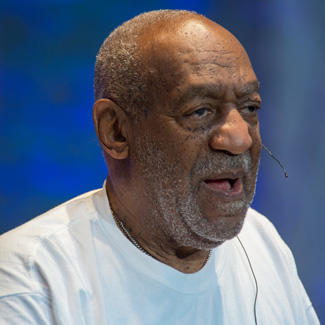Judge tosses Cosby accuser's defamation suit over rape denials, says lawyer didn't 'cross the line'

Bill Cosby. Randy Miramontez / Shutterstock.com.
A federal judge in Pittsburgh has dismissed a lawsuit against Bill Cosby that had claimed his sexual assault denials amounted to defamation.
In a decision (PDF) Thursday, U.S. District Judge Arthur Schwab said the denials by Cosby and his representatives were not defamatory and were not “highly offensive” to support a claim of false light invasion of privacy. Nor were they so outrageous as to support a claim of intentional infliction of emotional distress, Schwab found. The Associated Press, TribLive.com and the Wrap have stories on Schwab’s ruling.
The plaintiff, a Pennsylvania woman, had alleged that three statements were defamatory in that they portrayed her as a “liar and an extortionist.” None of the statements referred to the plaintiff by name and none expressly denied that Cosby had raped the plaintiff, Schwab said.
The first statement was issued a few days after the plaintiff accused Cosby in November 2014 of drugging her, sexually abusing her and raping her after they met on a children’s educational TV show in 1983. The Washington Post said the statement was issued by Cosby “aided by his attorney, Martin Singer.”
The statement said women had come forward in the past few weeks with “unsubstantiated, fantastical stories” that had “escalated far past the point of absurdity. These brand new claims about alleged decades-old events are becoming increasingly ridiculous. … It makes no sense that not one of these new women who just came forward for the first time ever asserted a legal claim back at the time they allege they had been sexually assaulted.”
Schwab said the statement was opinion and did not imply or allege that undisclosed, defamatory facts formed the basis for the opinion. “This sort of purely opinionated speech articulated by defendant’s attorney is protected and not actionable as defamatory speech,” Schwab said. “This court considers the Martin Singer statement to be purely an opinion proffered by an attorney who, while actively engaged in the zealous representation of his client, did not cross the line and defame the plaintiff.”
The second statement was a remark by Cosby during an interview that he wouldn’t respond to “innuendo” and “people should fact check.” The third was a statement by Cosby’s wife, Camille, saying the news media had failed to vet the stories of her husband’s accusers. Neither statement painted the plaintiff as a liar or an extortionist, and neither rose to the level of defamation, Schwab said.
See also:
ABAJournal.com: “Bill Cosby replaces his high-profile lawyer with BigLaw firm; were press statements the reason?”



